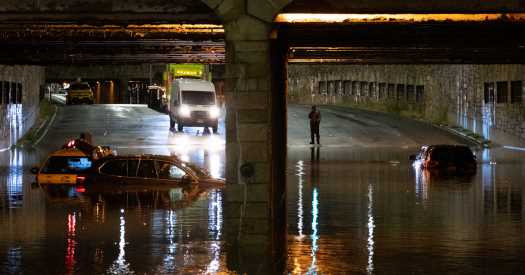Congress is considering bills to help communities prepare for extreme weather and to cut the greenhouse gases that are driving climate change. But passage is not assured.
By Coral Davenport and Brad Plumer
WASHINGTON — As the country reels from the cascade of deaths and devastation wrought by this summer’s record floods, heat waves, droughts and wildfires, President Biden and progressive Democrats are using the moment to push for aggressive climate provisions in a sweeping $3.5 trillion budget bill.
Speaking on Thursday in Queens, where nearly a dozen people died a day earlier during flash floods, Senator Chuck Schumer of New York, the majority leader, said that when the Senate returned to Washington on Tuesday to continue work on budget legislation, it would include provisions designed to reduce fossil fuel emissions linked to extreme weather.
Congress is also considering a $1 trillion bipartisan infrastructure bill that includes money to help communities gird against climate disasters. The Senate passed the bill last month and the House is expected to vote on it by late September.
That legislation includes $47 billion over five years in funding to improve the nation’s flood defenses, limit damage from wildfires, develop new sources of drinking water in areas plagued by drought and relocate some communities away from risky areas. It also contains $27 billion in spending to help harden electric grids against extreme weather events that are causing more frequent blackouts.
Mr. Schumer said the infrastructure and budget bills were paramount to prepare communities for more powerful storms, fires, droughts and floods and to stop the pollution that would heat the planet further and lead to even more extreme weather.
“Global warming is upon us, and it’s going to get worse and worse and worse unless we do something about it, and that’s why it’s so imperative to pass the two bills, the infrastructure bill, and the budget reconciliation bill,” he said.
Of the two pieces of legislation, the budget bill faces the more perilous path. Republicans are uniformly opposed to it because it also includes a raft of social spending, like funds for universal child care. Some Democrats are also unhappy with the $3.5 trillion price tag and want to scale it back, although a few who initially balked at the cost now say they may make an exception when it comes to climate provisions.
The budget bill will include a potent tool to cut greenhouse gas emissions — an incentive program designed to replace most of the nation’s coal and gas-fired power plants over the next decade with wind, solar and nuclear plants. It would be the strongest policy to fight climate change enacted by the United States.
Source: Read Full Article



